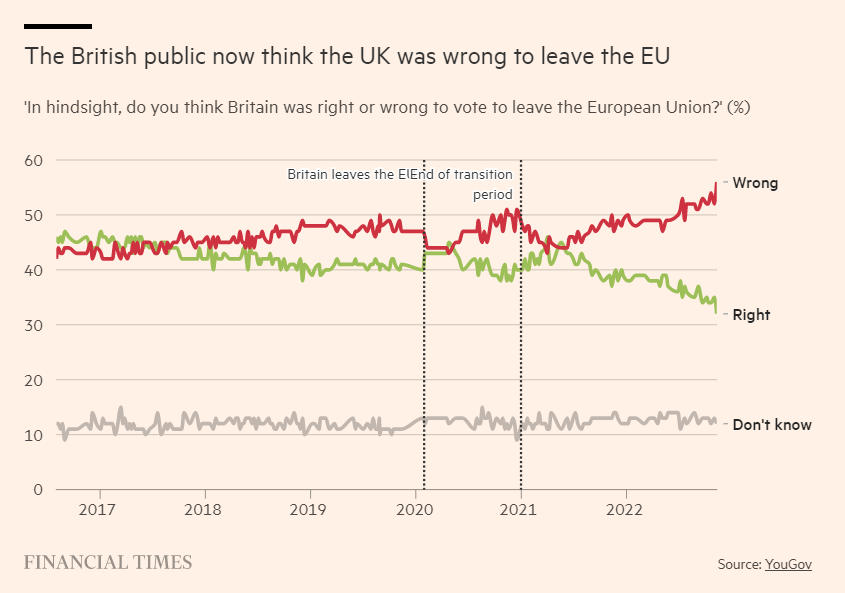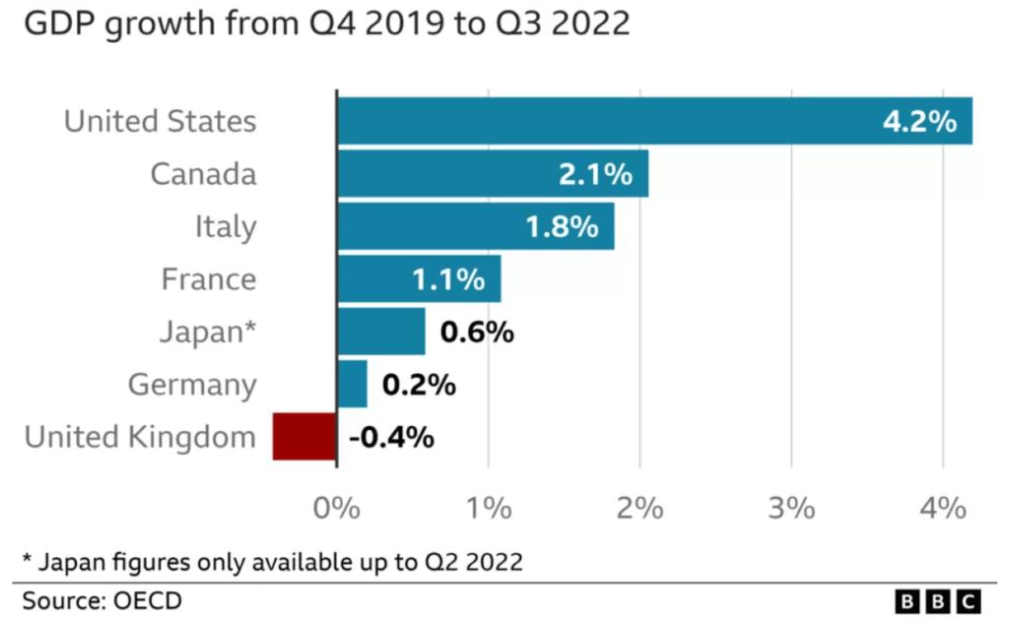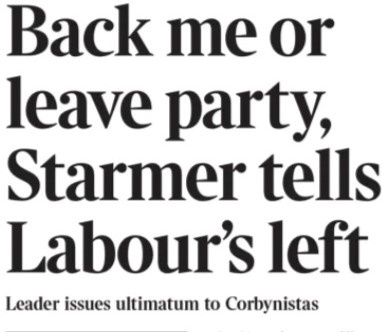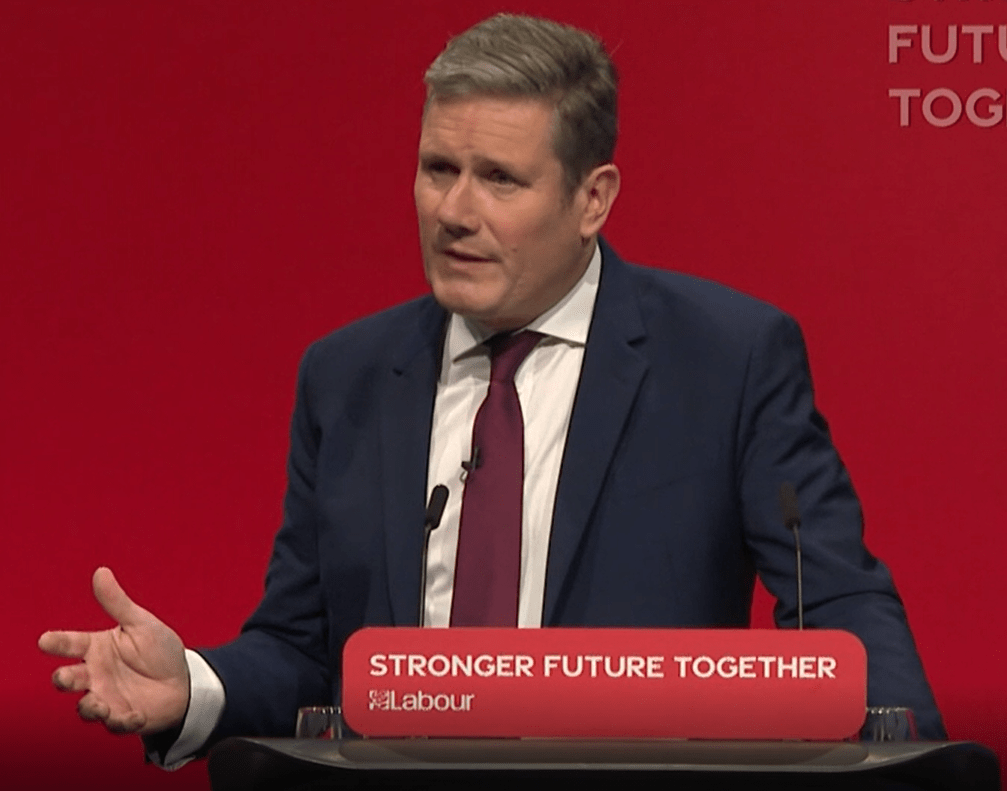The Labour Party leadership should not be indulging in secret discussions with the Tories over Brexit. We have come to expect little in the way of political principles from those around the Starmer leadership, but what makes these talks particularly unwelcome is the fact that they are taking place behind closed doors and beyond the scrutiny of Labour Party members.
According to last Sunday’s Observer, the private conference was held between Tory and Labour leaders to discuss the economic implications of Brexit. It was attended by senior members of Keir Starmer’s frontbench as well as the mis-named ‘levelling up’ minister Michael Gove. Former Tory ministers, Michael Howard and Norman Lamont were there, as well as the former chief Brexit negotiator, Oliver Robbins. Business leaders and diplomates were also invited. The working title of this secret two-day event, according to The Observer, was “How can we make Brexit work better with our neighbours in Europe?”.
Brexit has been a disaster for British capitalism.
The Observer also revealed that a confidential introductory statement acknowledged there was now a view among “some, at least, that so far the UK has not yet found its way forward outside the EU”, and that Brexit was “acting as a drag on our growth and inhibiting the UK’s potential”. This is actually a masterful understatement. For British capitalism, Brexit has in fact been a disaster, although it is rarely talked about in such blunt terms.

Left Horizons was always opposed to the propaganda around Brexit. We were opposed to a Tory Brexit, not because we had any illusions in the structure and organisation of the EU, which is essentially a ‘capitalist club’ established to further the interests of European business. Our objection to a Tory Brexit was because the Leave campaign was almost entirely based on reactionary jingoism and xenophobia and was part of a wider Tory project to attack the living standards of working people. It was funded by and rested on the greed of a narrow clique of hedge-fund managers and market gamblers, leavened by the political ambitions of unprincipled chancers like Boris Johnson.
Economic analyses, other than outright lies, barely featured during the referendum campaign, but in so far as there was any serious commentary, it anticipated that leaving the EU would have a ruinous effect on British capitalism. For that reason alone, and for the harm it was expected to do to jobs and living standards, it was worth opposing. And the doom-mongers were right.
The Brexit campaign was “a bunch of total lies”.
“Business leaders”, The Observer noted, who were “initially reluctant” to criticise the Tory decision to quit the EU, “have begun to find their voice”. Most recently, it says, a leading City figure has called Brexit a “complete disaster” and a “bunch of total lies”. In a report earlier this month, The Observer adds, the Governor of the Bank of England suggested that UK trade was feeling the impact of leaving the EU single market and customs union “more acutely than first estimated”.

There is not the slightest doubt among serious economists now that Brexit was a huge blow to the economy. As recently as December, it was estimated that the first two years of Brexit cost the UK government £40bn in lost revenue. Research by the Centre for European Reform (CER), carried by The Independent, showed that by last December, the economy was 5.5 per cent smaller than it would have been if the economy had remained part of the EU. “UK trade in goods is 7 per cent lower and investment is 11 per cent lower than it would have been had the Remain campaign won the 2016 Brexit referendum, according to the think tank’s analysis”.
Depending on who you ask, exports to the EU have fallen by between a fifth and a quarter of the level pre-Brexit. The reduction in trade from having left the single market and customs union has had a direct impact in terms of higher prices – particularly for food – and therefore in cutting living standards.
Every new tranche of economic data is worse than the last
Every release of new data on the ‘health’ of British capitalism seems to paint a worse picture than the last. In November, the OECD forecast that the UK economy was going to be the worst performer of all the G20 countries, with the exception of Russia. It forecast a reduction in UK GDP of around 0.4% for the whole of this year and a miserable rise of only 0.2% for next.
At the end of January, the Bloomberg economic website suggested that “Brexit is costing the UK economy £100 billion a year ($124 billion), with the effects spanning everything from business investment to the ability of companies to hire workers”.

As the Financial Times commented, investment is an important indicator of a country’s economic health and likely future prospects. After a “stall” following the 2016 Brexit referendum, business investment flatlined up to 2019 and then “fell off a cliff”, barely recovering since then.
The Office for National Statistics also reported that the gap between UK exports and imports grew by £2.4bn to £26.8bn, making it clear that the shortfall was “driven by lower exports of both goods and services” (Financial Times).
Is it as bad as the numbers suggest? Yes, it is – Financial Times
It goes from bad to worse. Last Friday, The Financial Times reported, “the government was hit by the latest blow. AstraZeneca, the pharmaceutical firm lauded for providing its Covid-19 vaccine at cost to the UK and developing-world countries, said it would make Ireland the location of a new factory once destined to nestle near its existing UK manufacturing centres in north-west England. Before Brexit, the UK’s pharma industry benefited from £2bn of EU research funding. No longer”.
It is also worth quoting at length an article in that same newspaper about the parlous state of British capitalism, with the tell-tale title: Is life in the UK really as bad as the numbers suggest? Yes, it is.
“At a time of shortages, we are certainly not short of gloomy economic forecasts. The Resolution Foundation think-tank notes that average real earnings have fallen by 7 per cent since a year ago and predicts that earnings will take four or five years to recover to the levels of January 2022.
“Yet if the forecasts are bad, it is the scene in the rear-view mirror that is truly horrifying. The British economy is in a generation-long slough of despond, a slow-burning economic catastrophe. Real household disposable income per capita has barely increased for 15 years.

“This is not normal. Since 1948, this measure of spending power reliably increased in the UK, doubling every 30 years. It was about twice as high in 1978 as in 1948 and was in touching distance of doubling again by 2008, before the financial crisis intervened. Today, it’s back at those pre-crisis levels”.
Squeeze as much as possible out of the workforce
Given the dire nature of the crisis facing British capitalism, with effectively an investment strike and a failure to develop productivity or growth, the policy of the political representatives of big business has become simple – squeeze as much as possible out of the workforce, even if that means the deepest cuts in the social wage and in actual living standards for generations. The political representatives of a bankrupt system have no other course than to maintain and intensify the austerity that has been their hallmark for twelve long years.
Under these circumstances, and with millions of workers electing to defend their living standards through their trade unions, it is disgraceful that ‘Labour’ leaders are meeting in secret with the political and economic representatives of a rotten system, the architects of austerity.
Yet, as a Tory MP complained in a newspaper interview, “We have widespread public dissatisfaction with capitalism. People feel alienated, they feel they live in a rip-off economy and it’s run for others, not them.” There has never been a better time for the advancement of socialist ideas.
If Labour were led by a leadership team with even a smattering of real socialist tradition, they would be putting forward policies openly – not in secretive meetings – to defend workers’ living standards. Workers should not be paying for the decay of a rotten and rigged economic system. A Labour programme that would win an election is one that came out clearly in workers’ interests:
- No cuts in living standards! Pay to be linked to the Retail Price Index!
- For a national minimum wage of at least £15 an hour.
- A freeze in all energy prices, nationalisation of the big energy companies profiteering from world oil and gas prices.
- A freeze on rents and mortgages. Rent controls managed by local authorities. No family to pay more than a reasonable proportion of income in rent.
- Re-nationalisation of all public utilities, railways and Royal Mail, these to be run democratically as public services, not ripped off for the benefit of a tiny minority.
- The nationalisation of the big FTSE100 companies that dominate the economy and the development of a democratic, planned economy
- Restoration of all local authority Tory cuts from 2010
- Abolition of PFI and all private contracts in the NHS with all services brought back in-house
- Repeal of anti-trade union legislation.
Campaigning on these sorts of ideas openly, on the streets, and in workplaces and communities, Labour could achieve a huge wave of support for its programme. Instead of doing this, at a time when million are desperately struggling to keep their heads above water, Starmer and his team are meeting in secret with the very authors of their misfortunes.
It is an approach that will only blow up in the faces of the Labour leadership, if not in the short term, while revulsion against the Tories is raising Labour in the polls, but certainly in the longer term after Labour is elected. Keir Starmer has now ‘invited’ the left to leave the party – perhaps as a preliminary to actually kicking the left out – but he will find in due course that the Labour Party is not his personal property and the real ‘owners’, millions of affiliated trade union members, will have their say.



